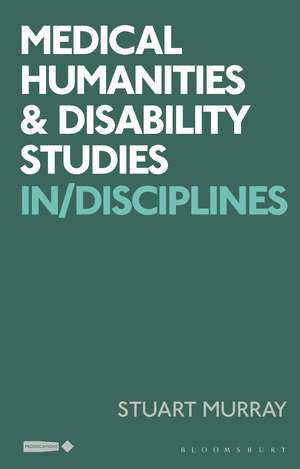Medical Humanities and Disability Studies: In/Disciplines: Critical Interventions in the Medical and Health Humanities
Autor Stuart Murrayen Limba Engleză Paperback – 20 sep 2023
| Toate formatele și edițiile | Preț | Express |
|---|---|---|
| Paperback (1) | 99.52 lei 3-5 săpt. | |
| Bloomsbury Publishing – 20 sep 2023 | 99.52 lei 3-5 săpt. | |
| Hardback (1) | 317.76 lei 6-8 săpt. | |
| Bloomsbury Publishing – 20 sep 2023 | 317.76 lei 6-8 săpt. |
Preț: 99.52 lei
Nou
Puncte Express: 149
Preț estimativ în valută:
19.05€ • 19.81$ • 15.72£
19.05€ • 19.81$ • 15.72£
Carte disponibilă
Livrare economică 24 martie-07 aprilie
Preluare comenzi: 021 569.72.76
Specificații
ISBN-13: 9781350172173
ISBN-10: 1350172170
Pagini: 144
Dimensiuni: 138 x 216 x 25 mm
Greutate: 0.2 kg
Editura: Bloomsbury Publishing
Colecția Bloomsbury Academic
Seria Critical Interventions in the Medical and Health Humanities
Locul publicării:London, United Kingdom
ISBN-10: 1350172170
Pagini: 144
Dimensiuni: 138 x 216 x 25 mm
Greutate: 0.2 kg
Editura: Bloomsbury Publishing
Colecția Bloomsbury Academic
Seria Critical Interventions in the Medical and Health Humanities
Locul publicării:London, United Kingdom
Caracteristici
Genuinely interdisciplinary - will appeal to a broad range of scholars within the fields of medical humanities and disability studies, as well as scholars working on the history of disability and the history of medicine.
Notă biografică
Stuart Murray is Professor of Contemporary Literatures and Film in the School of English at the University of Leeds, UK.
Cuprins
1. Undiagnosed2. Introduction: Missing Words, or Not Otherwise SpecifiedReflection 1: 342 Green3. Chapter 1: Medical/Disabled, Different/SameReflection 2: Sunday in the Park with Lucas4. Chapter 2: Disability Minds Medicine HealthReflection 3: Straps5. Chapter 3: Medicine Bodies Health DisabilityReflection 4: Outside the Frame6. Conclusion: AgileLast
Recenzii
Written lyrically and with brilliant clarity across multiple genres, this book continually invites new possibilities, "provoking to clarify." I am aware of no other book that sustains an inquiry into the relationship between medical humanities and disability studies-much less one that uses the conjunctions and disjunctions between them to critique both disciplines.
Sharp and on target, Stuart Murray offers readers a foray into the intersections of the medical humanities and disability studies, their lacunae, and possibilities. Murray draws on memoir and personal experience to demonstrate how an "indisciplined" approach to life writing provokes potentials for change through an appeal to "agility" in our conceptions of ill-health, disability, and disorder and their roles in medicine, care, and social theory. Compelling and compulsive in its argumentation-Medical Humanities and Disability Studies is the kind of book we need more of. We should all be so indisciplined!
Medical Humanities and Disability Studies argues against insularity and choosing sides in favour of an agile, indisciplined mode of criticism that embraces generative doubt and productive troubling. With a variety of women's life narratives as its strong foundation, and richly affective personal vignettes as its spine, Stuart Murray's book is packed with insights and provocations: from the agile chapter titles and paths taken to find the words and form for his work, to the manifold manifestations of difference/same in experiences of health and disability, and the "in/un/ill-disciplined" acts of drawing on the working methods of one discipline to critique the success of the other. In modelling the intellectual and creative agility found within its archive, this book offers a sensitive and compelling exploration of the fusions of life stories and critical frames and of the complex interweavings of medical humanities and disability studies.
By turns forceful and tender, indisciplined and agile, this book embodies what it might mean to think with and between Disability Studies and Medical Humanities. Holding to the conceptual complexity and political force of lived experience, this is a vital, unsettling, beautiful book.
Sharp and on target, Stuart Murray offers readers a foray into the intersections of the medical humanities and disability studies, their lacunae, and possibilities. Murray draws on memoir and personal experience to demonstrate how an "indisciplined" approach to life writing provokes potentials for change through an appeal to "agility" in our conceptions of ill-health, disability, and disorder and their roles in medicine, care, and social theory. Compelling and compulsive in its argumentation-Medical Humanities and Disability Studies is the kind of book we need more of. We should all be so indisciplined!
Medical Humanities and Disability Studies argues against insularity and choosing sides in favour of an agile, indisciplined mode of criticism that embraces generative doubt and productive troubling. With a variety of women's life narratives as its strong foundation, and richly affective personal vignettes as its spine, Stuart Murray's book is packed with insights and provocations: from the agile chapter titles and paths taken to find the words and form for his work, to the manifold manifestations of difference/same in experiences of health and disability, and the "in/un/ill-disciplined" acts of drawing on the working methods of one discipline to critique the success of the other. In modelling the intellectual and creative agility found within its archive, this book offers a sensitive and compelling exploration of the fusions of life stories and critical frames and of the complex interweavings of medical humanities and disability studies.
By turns forceful and tender, indisciplined and agile, this book embodies what it might mean to think with and between Disability Studies and Medical Humanities. Holding to the conceptual complexity and political force of lived experience, this is a vital, unsettling, beautiful book.






